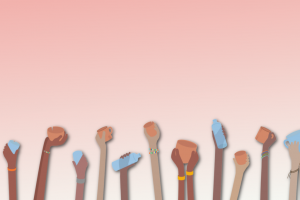The Mississippi Water Crisis is Hitting Families Hard — Here's How You Can Help

Record-setting rainfall is flooding the streets of Jackson, Mississippi. Complications with the city’s main water treatment facility means there’s not enough water to fight fires. People are catching rain water to try to flush their toilets and brush their teeth. Mississippi Gov. Tate Reeves issued a statement explaining that there’s “near certainty Jackson would fail to produce running water sometime in the next several weeks or months.”
And families across the city are scrambling as they deal with the realities of this catastrophe.
On Tuesday, it was announced that Jackson public schools have been temporarily closed and students are switching over to virtual learning. This creates an unprecedented burden on parents and caregivers, particularly in low-income households, who are forced to navigate between earning their paycheck and taking care of their children, who are stuck at home. Families who rely on school breakfast and lunch programs to feed their kids are stuck in a particularly vulnerable position.
This isn’t the first time that a water catastrophe has hit Jackson’s residents. Thanks to aging infrastructure that has long been neglected, locals have dealt with multiple service disruptions and advisories to boil water because of the possibility of lead and E. coli bacteria, NPR reports. In winter 2021, a storm almost took out the water system in Jackson, leaving tens of thousands of people without water.
“August should be a time of joy for our students. This is a time when our back to school season starts. This is a time when we’re getting to know our students. Many of our teachers have classroom wishlists that normally include crayons, notebooks, paper, pencils,” Erica Jones, president of the Mississippi Association of Educators, told The Guardian. “This year we’ll have to include water, bottled water and water containers. Our parents can’t afford it.”
20% of Mississippi residents live in poverty, according to the 2019 census report; but in Jackson, it’s 25%.
Reporters on the ground shared stories of parents struggling to acclimate, with one NBC News journalist recounting an 11-year-old girl bringing home a big bottle of water when she should be in school. “It shouldn’t be like this,” her grandmother, Lorene Terrell, said. A mom told CNN that the water is running brown in her tap, forcing her and her three kids to buy water so they can cook and brush their teeth.
So what can be done right now to make sure that families have the resources they need?
One place to start is by supporting out-of-state food banks that are delivering supplies to food banks in Jackson. As of yesterday, the Midwest Food Bank has sent three semi-trucks packed with bottled water to the capital, with another two trucks leaving today. The organization partners with the Salvation Army to get supplies out within 24 hours. You can make a donation on the Midwest Food Bank’s website, and specify that you’d like the funds to go to “Disaster Relief.”
You can also send cases of water directly to sites that are distributing water to people in need. There are multiple places accepting donations, including the Pearl Street AME Church, which is dealing with an influx of roughly three times more drop-ins per day than usual, Pastor Samuel H. Boyd Sr. told SheKnows by phone. Shipments can be made to 2519 Robinson Street, Jackson, MI, 39209.
“We have over 300 families who come,” Boyd said. “We see families in cars, we see individuals in cars. When they come, we try to put at least two cases in the car.”
Turning Point Mission Center, which services South Jackson, Mississippi, an area with high poverty rates, is also accepting donations of water, which can be shipped to 1814 Shady Lane Drive Jackson, MS, 39204. “If you were to send a truckload of water, we would notify the community we work with, the radio station and we’d also send through to our communication channels. Then, the people would come,” Pastor Arnette Owen explained to SheKnows. “We’ll be there to serve them.”
Several of these mission centers, churches and food pantries — including Pearl Street and Turning Point — have cash apps and PayPals (the info is available on their respective websites) which allow you to donate money directly, so they can continue to purchases cases of water for the community. You can also reach out to the Mayor’s office at (601) 960-1084 to find out more about donating water to the city. When reached over the phone, a representative confirmed that donating water is incredibly helpful right now.
“Please pray for us,” Pastor Boyd told SheKnows. “That we can get our water system up and running and that we can supply to those who are in need.”
Source: Read Full Article